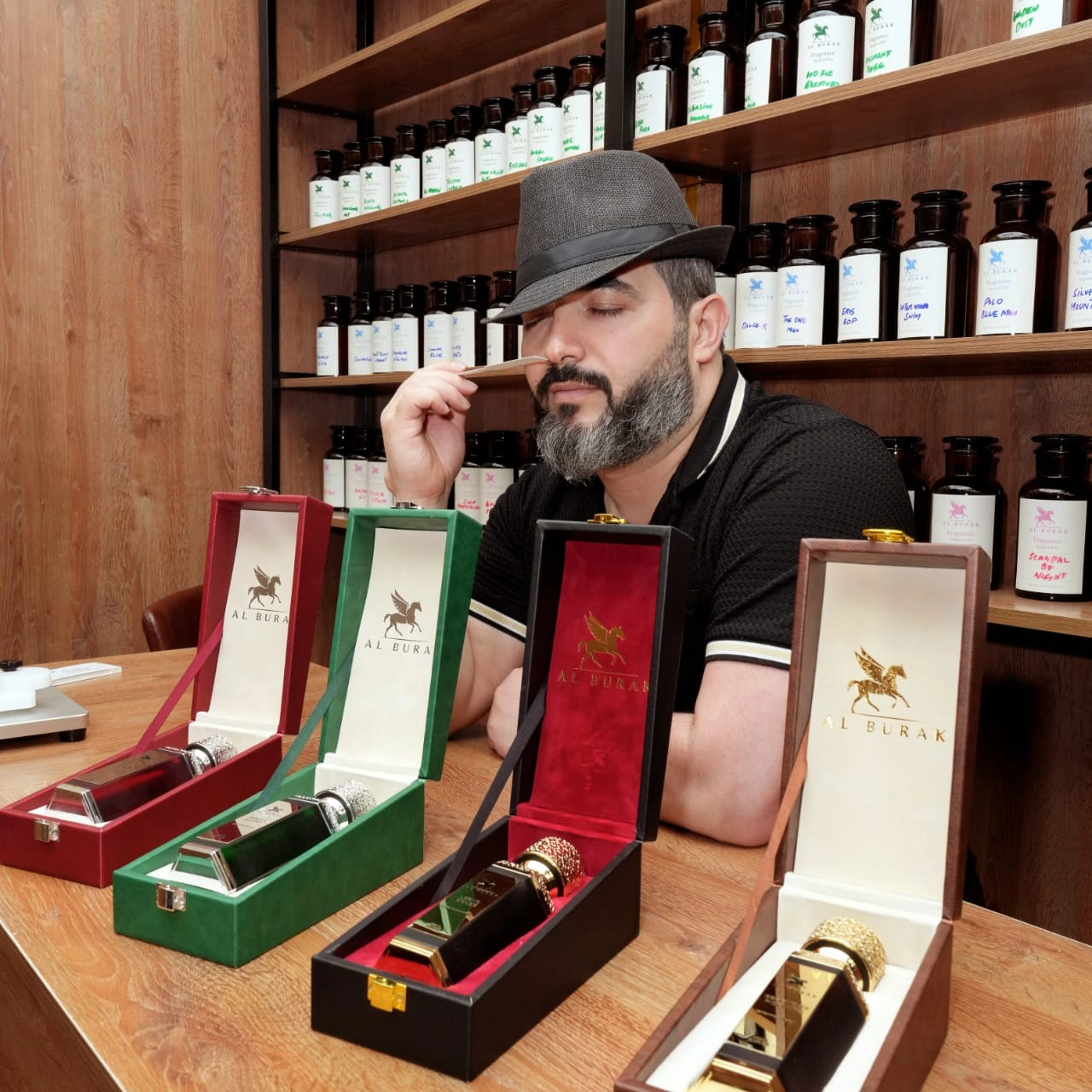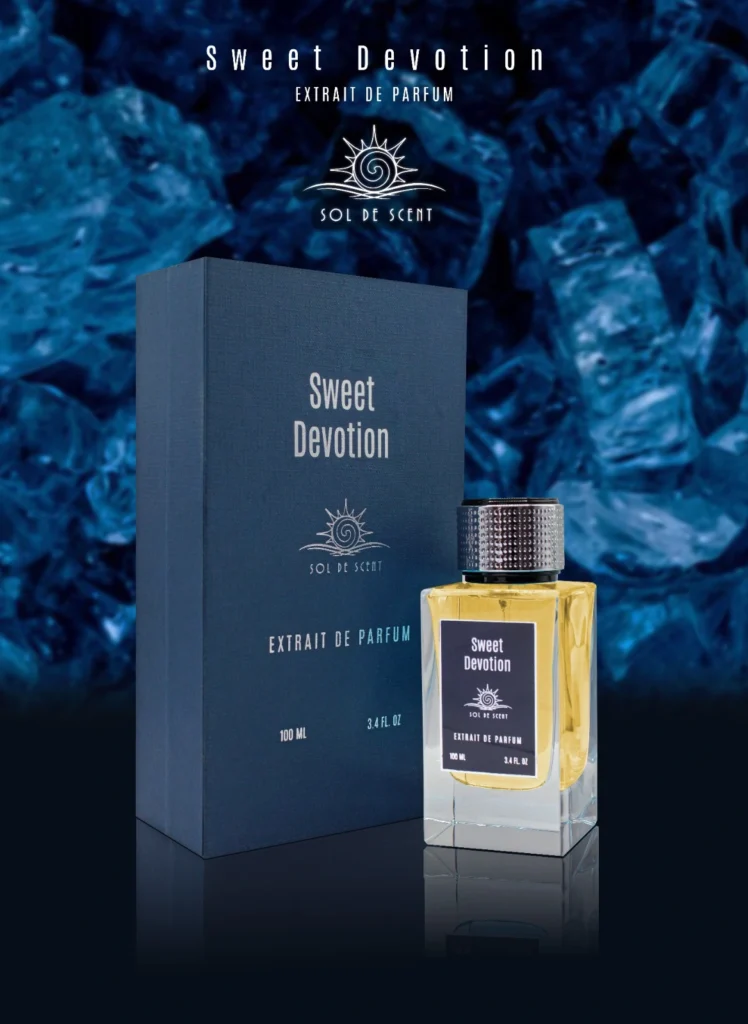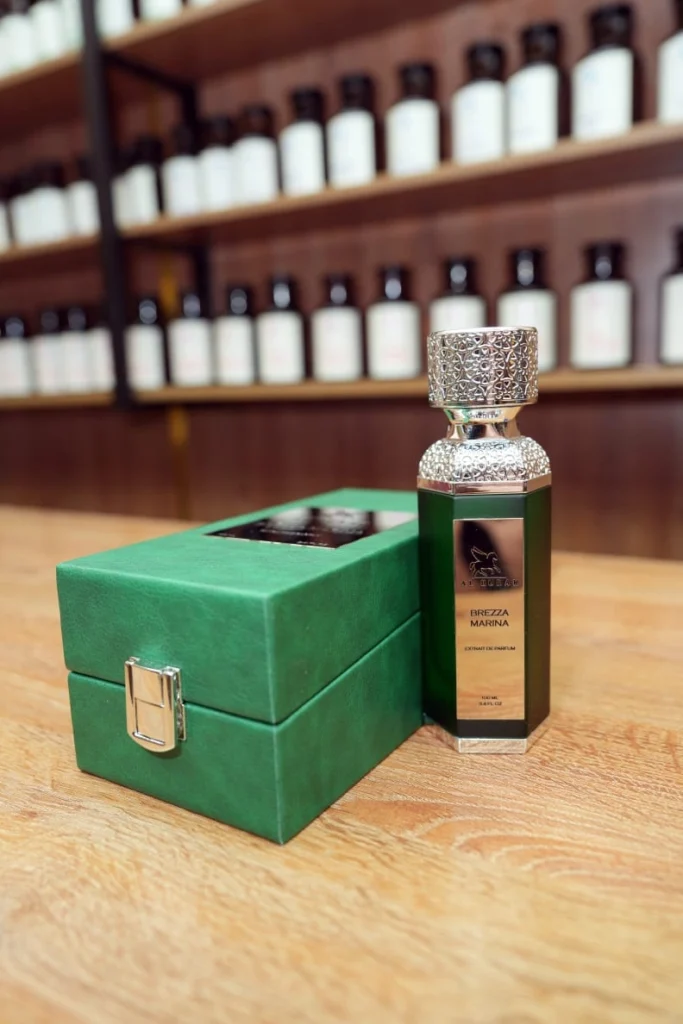The Story of Al Burak Perfumes & Mohammad Fouad Al-Hraki
Al Burak Perfumes
The Story of Mohammad Fouad Al-Hraki and Al Burak Perfumes
By Dana Al Bashiti

In the Middle East, perfume is more than a luxury, it is heritage, identity, and daily ritual. While the world embraces fragrance as fashion or self-expression, in Arab culture, perfume is woven into the fabric of life itself. From religious traditions like the use of oud and musk during prayers, to the daily gesture of perfuming garments before leaving home, scent holds a revered place. It carries history, marks celebration, and evokes memory in ways unmatched elsewhere. This reverence for fragrance is especially apparent in the story of Mohammad Fouad Al-Hraki, the founder of Al Burak Perfumes, whose journey redefines perfume as an emotional language that speaks directly to the soul.
Mohammad Fouad Al-Hraki doesn’t just create perfumes, he reconstructs memories. His roots in Damascus, Al-Harjala, and Ain al-Fijeh are inseparable from the inspiration behind his creations. He often speaks of Damascus not just as a place, but as a scent. “Fragrance is emotional architecture,” he says. He remembers the scent of jasmine in Al-Qanawat, insisting that it carries particles of Damascene soil and the warmth of its ancient stones. In his lab, he uses refined techniques such as cold enfleurage to capture this essence with purity, but it is his memories that guide the process. Despite the science, the heart of the fragrance remains entirely Syrian.
One of his most poetic creations is a perfume he named A Whiff of Nostalgia, which he describes as an emotional-chemical equation, one part morning mist from Mount Qasioun, one part the scent of his mother’s handkerchief tucked away in a drawer from his school days. Technically, he uses white musk and bergamot to evoke the sudden warmth of recollection, but the true alchemy lies in how the scent makes absence feel tangible. For Al-Hraki, perfume is a way to hold onto people, moments, and places no longer near.
His career has taken him through some of the finest establishments in the fragrance world, such as Paris Gallery and Roja Parfums. From Paris Gallery, he learned the art of presentation, how to sell a fragrance as a story. From Roja, he grasped the discipline of timing in composition, likening it to a symphony. Still, his own style matured with intention, swapping classical French elements for deeper Eastern notes like Yemeni frankincense and Ceylonese cinnamon. These ingredients reflect not only his personal taste but his cultural identity.
He often maps his perfumes like scenes from memory. One such creation is Pavement d’Enfance, inspired by the sidewalks of his childhood. At its heart is Arabic coffee, blended with the scent of old schoolbooks. Using steam distillation to extract the warmth of roasted beans and base notes of cedarwood to honor his family’s wooden bench, the fragrance becomes a tribute to personal history. Strikingly, customers often say it reminds them of their own childhoods, even if the details differ. This is the mark of true craftsmanship, creating something deeply personal yet universally relatable.
Al-Hraki works from what he calls a “Fragrance Map.” He imagines a setting, such as his grandfather’s courtyard, and then seeks out the ingredients that represent it. To mimic the smell of earth after rain, he blends geranium with patchouli.


But the most demanding part of this journey is fixation, where he tests the scent on skin over 24 hours to ensure that the memory it evokes does not fade too quickly.
His understanding of perfume is deeply tactile and artistic, often drawing parallels with cooking. Just as the right oil temperature can make or break a dish, so too can the evaporation rate of perfume notes shape the final story. He gives the example of saffron, a note that must appear ten minutes after application, in the same way its flavor unfolds after chewing.
For Al-Hraki, exile has not been just a physical journey, it’s also been scented. Creating perfume is his way of reconnecting with Syria. When he blends Damascene rose with amber, it is as though he is gathering scattered fragments of his city. Even when he substitutes rare botanicals with chemical equivalents due to availability, he never loses sight of the originals. Chemistry, he insists, must serve memory, not replace it.
Preserving authenticity in his work has been a challenge. To recreate rare notes like Damascene jasmine or Zabadani cherry, he turns to chromatography to analyze their chemical makeup, then reconstructs them using available ingredients. In one case, he used benzaldehyde, which occurs in almonds, and combined it with orange blossom to capture the elusive cherry scent. The result feels remarkably faithful to the original, a triumph not just of science but of nostalgia.
One of his most powerful moments came when an elderly customer tried his fragrance Café Nuri, inspired by the old coffee shops of Damascus. The man teared up and said it reminded him of the scent of dawn after Taraweeh prayers. For Al-Hraki, that moment confirmed that his technique had succeeded, not in a scientific sense, but in the most human way possible. When fragrance disappears into emotion, it has truly done its job.
Looking to the future, Al-Hraki dreams of returning to Syria to launch a project called Perfume of Peace. This fragrance would be made entirely with local ingredients such as olive and citrus, symbols of resilience and rootedness. Though he plans to integrate modern tools like molecular fragmentation, he insists that its soul would feel like a breeze moving through the old alleys of Damascus.
Through Al Burak Perfumes, Mohammad Fouad Al-Hraki offers more than a sensory experience. He gives us pieces of places we’ve loved, moments we’ve lost, and emotions we thought we’d forgotten. His work stands as a reminder that in the Middle East, perfume is not simply worn, it is lived. It is ritual, memory, identity, and in every bottle, Damascus breathes again.
